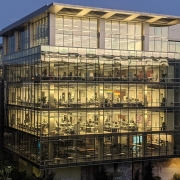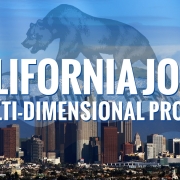California’s Keenest Competitors for Tech Jobs are Blue Western States
For a generation, California has seen more of its residents and companies head elsewhere, but has found a way to respond, at least in terms of wealth creation, by constant innovation. But today, the Golden State’s hold on the elite reaches of the economy is slipping in ways that could threaten the state’s long-term prosperity.
Innovation is California’s best driver of high wages and upward mobility. Bureau of Labor Statistics data show that in the innovation industry — software, computer and semiconductor manufacturing, technology services and nine other sectors — the median wage was $208,000 in California last year. That’s almost three times the $76,000 median wage for all jobs in California.
But now, prime competition for innovation-based jobs comes not only from low-tax, low-cost states like Texas but also from bluish states such as Colorado and Washington. We found that Washington and Utah have actually created more innovation sector jobs per capita than California over the past decade, while Arizona, Colorado and Idaho have had higher per capita growth rates for such jobs.
Many of these states, noted Christopher Lloyd, chair of the Site Selection Guild, which follows investment flows, are duplicating “many of the great things about California.” This includes building elite university systems in places like Washington, Texas, Colorado and Utah. “The development model has turned on its head,” Lloyd suggests. “These states have learned from California. There seems to be a failure there to recognize things have changed and tech people are much more mobile.”
Keeping tech in California is all the more critical with the state suffering the nation’s highest unemployment rate and Los Angeles the highest of any large metro area. We have already experienced a troubling shift in business and professional service jobs such as accountants, lawyers and management consultants, the largest source of higher-wage jobs. Over the last three decades, Texas saw more than double the level of California’s growth in that sector, but Washington, Oregon and Colorado also outperformed California by a wide margin.
Now tech seems also under assault. Some tech linchpins have already moved their headquarters to Texas, including Hewlett Packard Enterprise, Oracle and, perhaps most crucial, Tesla. Many other firms, like Apple, Airbnb, Amgen, Uber and SpaceX, are expanding largely outside of this state. These trends are accelerating, notes a recent Hoover Institution study.
Of course, big companies often move production and jobs to cheaper locales. But growth in the number of innovation businesses is also slowing. Since 2005, the number of these businesses grew far faster on a per capita basis in Arizona, Utah, Colorado, Florida, Georgia and Oregon. This is not only a reflection of high taxes and regulation; many of our keenest competitors, such as Washington, Oregon and Colorado, are hardly governed by conservative, anti-regulatory politicians.
Read the rest of this piece at Los Angeles Times.
Joel Kotkin is the author of The Coming of Neo-Feudalism: A Warning to the Global Middle Class. He is the Roger Hobbs Presidential Fellow in Urban Futures at Chapman University and Executive Director for Urban Reform Institute. Learn more at joelkotkin.com and follow him on Twitter @joelkotkin.
Marshall Toplansky is a clinical assistant professor of management science at the Argyros School of Business and Economics at Chapman University.
Homepage photo: Alek Leckszas, via Wikimedia, CC 4.0 License.








 Tony Webster, used under CC 2.0 License
Tony Webster, used under CC 2.0 License